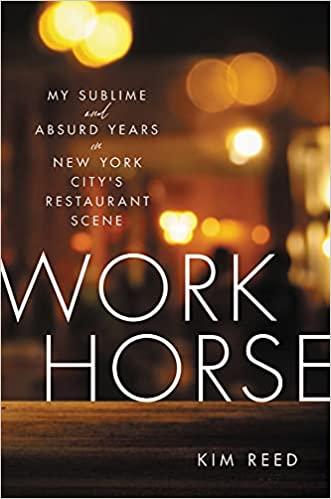You have /5 articles left.
Sign up for a free account or log in.
 Workhorse: My Sublime and Absurd Years in New York City’s Restaurant Scene by Kim Reed
Workhorse: My Sublime and Absurd Years in New York City’s Restaurant Scene by Kim Reed
Published in November 2021
Whenever I listen to books about the business, culture and operations of restaurants and the restaurant industry, I’m always trying to find insights for our work in higher education.
The most recent restaurant industry book that I read (by audiobook) is Workhorse: My Sublime and Absurd Years in New York City’s Restaurant Scene by Kim Reed.
Workhorse offers an insider account of the restaurant industry from the longtime executive assistant to Joe Bastianich, co-owner of 30 restaurants in four countries. The book describes how work in and around the restaurant industry is all-consuming for those who choose that life. Reed started working part-time as a hostess at the famed N.Y.C. Italian restaurant Babbo while in graduate school and continued this part-time gig through her years as a social worker. From that restaurant job, Reed moved to a full-time role as Bastianich’s executive assistant.
Those who know restaurant and food culture are probably aware that Babbo was co-owned by Mario Batali. Workhorse is not an insider account of the sexual harassment perpetrated by Batali. While the scandal plays a role in Workhorse, it comes near the end of the book. Reed was not personally involved in or a witness to Batali’s crimes.
Instead, Workhorse is about how a job can become all-consuming. Workers in the restaurant industry are particularly vulnerable to suffering from an unhealthy work-life balance. The hours are extremely long, the competition is cutthroat and the personalities tend toward the extreme.
As Reed details in Workhorse, it is not only the servers and the bartenders and the chefs who can lose themselves entirely in the work of working in the restaurant industry. As an executive assistant to a restaurant owner (and food TV personality), Reed found herself working the insane pace and hours common across the industry.
The personal, emotional and physical price that Reed pays for the workaholism necessary to excel at her job should be a cautionary tale for us all.
Academia can be just as much of an occupational hothouse as the restaurant world. For traditional academics, the pressures (and sometimes impossibility) of finding a tenure-track role are well-known. So are the stressors and sacrifices necessary to earn tenure for those fortunate enough to get that opportunity.
A great many part-time, adjunct and contingent faculty spend years navigating the low pay and employment insecurity for the privilege of working as educators in an industry (academia) to which they remain unshakably loyal. This work is undertaken despite any commensurate loyalty among the colleges and universities that employ their services.
For nontraditional and alternative academics and higher education staff, the pressures of academic work can also be extreme. The pandemic has only added to the stressors of chronic public underfunding, demographic headwinds, rising costs, declining revenues, understaffing and endemic scarcity that defines so much of the postsecondary sector.
How many people do you know in higher education who all the time? Colleagues who work nights and weekends and can be found sending email during their vacations?
Those who are fascinated by extreme subcultures, the business of restaurants and the life of executive assistants will find Workhorse a worthwhile read.
Reading Workhorse may also convince you to step away from that Zoom and decline to submit that new grant application or publish that next article.
Instead, Workhorse may inspire you to spend some time doing something that has nothing at all to do with your higher education career.
What are you reading?




